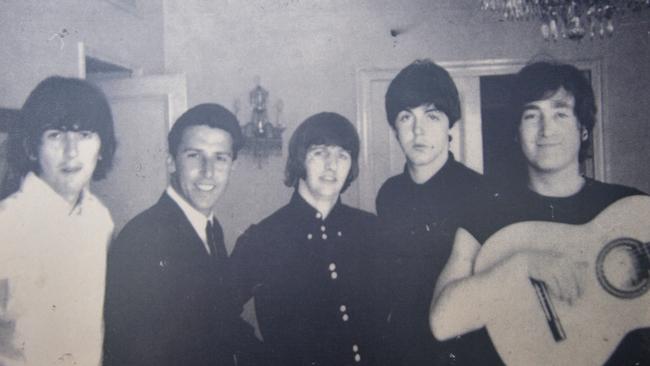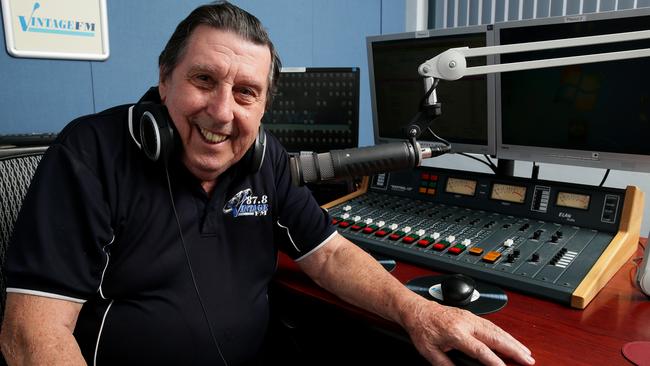Graham Webb left a sinking ship and became a broadcasting star
Radio and TV star Graham Webb led a remarkable life that included being rescued from a pirate radio ship sinking in the English Channel.

OBITUARY
Graham Webb Broadcaster
Born Parramatta, NSW, April 19, 1936; died Gold Coast, April 26, aged 88.
Graham Webb was so many things in his endlessly adventurous life: he developed and presented a music television show that inspired MTV; he was a legendary pop music radio host who interviewed The Beatles, the Everly Brothers and The Monkees; a TV star; the Seven Network’s voiceover man; founder of seniors’ radio; and even a shipwrecked and distressed mariner.
Starting at Tamworth’s 2TM aged 18, he soon headed up to Brisbane’s 4BH, outside whose premises was a letter box into which listeners could drop off suggestions for music they wanted to hear. That idea, simple and modest as it was, stuck with Webb for a lifetime. It was the listeners’ radio station. The announcers just worked there.
After working in Gympie, he served in one of the last intakes of National Service and, on returning to Sydney, joined the ultraconservative 2CH. The “CH” stood for church – the licence was owned by the NSW Council of Churches. There he met a sport commentator, Reg Grundy, and worked with him as Grundy developed a radio game show called Wheel of Fortune. This would transfer to television and Grundy would become an international creator of game shows and drama.

Moving to 2UE – which billed itself as the Modern Station – Webb worked alongside Gary O’Callaghan, Bob Rogers and John Laws. After three years he moved to 4KQ and back to Sydney with 2GB, and then headed to Europe, fetching up in London as pirate radio was peaking.
These were unlicensed radio stations broadcasting illegally across Europe but particularly to Britain, where the BBC held a monopoly on radio and television. It was technically illegal even to listen to them as they broadcast from rickety, timeworn ships anchored in the English Channel. They appealed to younger listeners who, following the emergence of The Beatles, were suddenly recognised as a separate consumer group the dowdy BBC bosses did not understand.
The famous pirates were Radio Jackie, Radio London and, most famously, Radio Caroline, named after US president John F. Kennedy’s daughter Caroline, who is now the American ambassador in Canberra. Webb worked there with several colleagues who, when the BBC caved in and launched a pop music station in 1967, would become land-based radio legends including Dave Lee Travis and Tony Blackburn.
They were broadcasting from the accident-prone, past its use-by date MV Mi Amigo, a creaking schooner built in 1921, when on January 20, 1966, during a force eight gale, it lost its anchor and drifted towards the Essex coast.
No one noticed until morning when Travis went up on deck and realised they had lost their mooring and were in trouble. They ran aground and locals rescued the disc jockeys using a zip line from shore. Expecting to be arrested and their broadcast gear confiscated, they went to the local police station where sympathetic police decided they were subject to an ancient laws of the sea and declared them shipwrecked and distressed mariners, and that the police had a duty to render assistance and clothe and house them. Webb joined the others in the morning as they chose clothes from a local menswear shop.
The Mi Amigo would be run aground twice more, lose two masts in gales and sink in 1980.
Webb was back in Australia by 1967 and hosting the long-running Family Favourites, a joint venture between the ABC and BBC in which British migrants would send in messages to family back home while choosing sentimental songs. Its huge, loyal and older demographic gave Webb an idea that he would work on later.
He was by then living in Sydney’s Balmain, in the house once owned by World War I prime minister Billy Hughes.
Webb hosted the TV shows Blind Date and Jeopardy and, in 1974, created The Graham Webb Saturday Today Show which evolved into Sounds Unlimited, a rambling three-hour music program Saturday mornings for which he had in-house editor Russell Mulcahy produce inexpensive videos, leading to Mulcahy’s international career that has involved editing videos for Paul McCartney, the Sex Pistols and AC/DC.
Touring solo across Australia late in 1977, The Monkees’ Mike Nesmith saw the show and worked up his own version that he called PopClips, which in turn was bought by Time Warner and turned into MTV.
Webb founded a radio station with a format to attract seniors, Sunshine FM, hosting its breakfast show for a decade. Later he broadcast on other stations with formats based on it.
Legendary music figure Glenn A. Baker would often talk about bands and records on Sounds Incorporated.
“He was generous to a young kid keen to impart his enthusiasm and burgeoning knowledge,” Baker said of Webb this week.




To join the conversation, please log in. Don't have an account? Register
Join the conversation, you are commenting as Logout